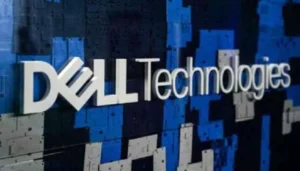Dell Technologies is facing growing internal dissatisfaction, according to its latest annual employee engagement survey, “Tell Dell.”
The results show a significant drop in employee satisfaction for the second consecutive year, even as managers continue to receive strong approval ratings.
The findings reveal a complex workplace sentiment influenced by return-to-office mandates, layoffs, and shifting company culture.
This sentiment persists even as the company experiences financial growth and intensifies its focus on artificial intelligence.
Dell Technologies: Decline in Employee Net Promoter Score
The most notable metric from the survey is the employee net promoter score (eNPS), which fell to 32 in 2025.
This marks a steep decline from 48 in 2024 and 63 in 2023, representing nearly a 50% drop over two years.
The eNPS measures how likely employees are to recommend Dell as a workplace, and the current score is well below the benchmark Dell aims to maintain.
Chief Human Resources Officer Jenn Saavedra acknowledged the decline in an internal video update, attributing it to the “pace and scale of change” within the company and the broader environment.
She emphasized that Dell takes the results seriously and is committed to addressing employee concerns through increased transparency and more frequent team conversations.
Factors Driving Dissatisfaction at Dell Technologies
Several factors have contributed to the drop in satisfaction. Employees cited return-to-office (RTO) mandates, ongoing layoffs, and AI-driven restructuring as key sources of frustration.
Dell’s RTO policy, which began ramping up in early 2024, now requires employees living near a Dell office to work onsite five days a week.
This shift has been described by some staff as abrupt and lacking empathy, especially after years of flexible work arrangements.
In addition, Dell has reduced its workforce by 25,000 employees over the past two years—a 19% cut—bringing its global headcount to approximately 108,000.
Employees report increased workloads, limited internal mobility, and a growing sense of job insecurity.
One long-time engineer described the cultural shift as “gradual and with decreasing compassion,” noting that the constant layoffs have eroded trust.
Managers Receive High Marks
Dell’s leader net promoter score remains strong at 76, even as overall satisfaction declines. This shows that employees continue to view their managers in a positive light.
Survey responses suggest that managers are seen as supportive, collaborative, and instrumental in helping teams navigate modernization efforts.
Jenn highlighted this contrast in her update, noting that employees feel respected by their leaders and appreciate their efforts to uphold Dell’s Culture Code values.
The distinction between leadership and broader organizational sentiment highlights a key divide.
While employees may feel disillusioned with company-wide policies, they continue to value the guidance and support provided by their immediate supervisors.
Company Response and Future Plans
Dell plans to improve visibility by sharing quarterly updates based on survey findings.
Managers will also lead team-level reviews of the Tell Dell results to encourage open dialogue.
The company is encouraging more frequent two-way conversations and promoting the use of well-being resources.
However, some employees remain skeptical about whether these measures will lead to meaningful change.
Dell continues to position itself as a key player in the AI infrastructure space.
Dell’s ISG division, which develops AI servers, reported a 29% year-over-year growth.
The company’s total revenue reached $95.6 billion in FY2024, marking its third-highest annual result.
While the company’s external performance remains strong, internal morale appears to be lagging behind.
Note: We are also on WhatsApp, LinkedIn, Google News, and YouTube, to get the latest news updates. Subscribe to our Channels. WhatsApp– Click Here, Google News– Click Here, YouTube – Click Here, and LinkedIn– Click Here.



